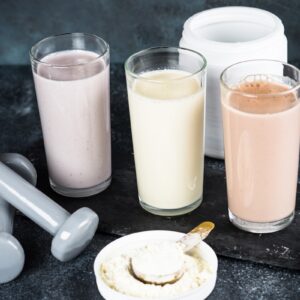
Maximize Muscle Gains: Mastering Protein Shakes for Men
In our fast-paced world, convenience often wins over traditional meal preparation. Enter protein shakes—a quick fix for those seeking to up their protein intake without the hassle of cooking. But are we going overboard with these shakes, replacing real food?
Understanding Protein Powders
Let’s break it down: Protein shakes typically contain powdered protein mixed with water, milk, or other beverages. These powders, available in stores or online, offer a convenient way to boost protein consumption. Whether derived from plant sources like soy, peas, or hemp or animal sources such as milk or eggs, protein powders usually provide 20 to 30 grams per scoop. While they vary in composition and purpose—some geared towards muscle building with higher protein content, others for weight loss—many contain additives like sugars, artificial flavors, and additional vitamins and minerals.
Potential Risks
While protein powders offer convenience, they’re not without risks. Considered supplements rather than food, they’re not subject to the same stringent regulations by the FDA. This lack of oversight raises concerns about ingredient safety. Some individuals may experience digestive issues, particularly if allergic to dairy or have lactose intolerance. Moreover, certain protein powders may contain alarming levels of added sugars or even toxins such as bisphenol and heavy metals like lead and arsenic.
Protein Shakes and Men’s Health
Protein has long been prized by men for its muscle-building properties. Whey and casein are complete proteins that provide all of the essential amino acids. They are derived from cow’s milk. Plant-based alternatives like soy or pea protein also offer similar amino acid profiles. For men aiming to optimize muscle mass, daily protein intake should fall between 1.0 to 1.6 grams per kilogram of body weight.
Finding Balance
While protein shakes can serve as convenient protein sources, they shouldn’t replace whole foods entirely. They should supplement a balanced diet rather than serve as meal replacements. Limiting consumption to two shakes per day is advisable for most individuals, with active individuals or those needing extra protein due to illness potentially benefitting more. Moderation is critical, as excessive reliance on shakes can lead to nutrient deficiencies from lacking diverse food sources.
Conclusion
Protein shakes are a quick, convenient, and an easy way to increase protein intake for busy individuals or those with special dietary requirements. However, they should be used judiciously and with a well-rounded diet. By understanding the role of protein shakes and exercising moderation, individuals can harness their benefits without sacrificing nutritional variety or becoming overly reliant on supplements.
Dr. David Samadi is the Director of Men’s Health and Urologic Oncology at St. Francis Hospital in Long Island. He’s a renowned and highly successful board certified Urologic Oncologist Expert and Robotic Surgeon in New York City, regarded as one of the leading prostate surgeons in the U.S., with a vast expertise in prostate cancer treatment and Robotic-Assisted Laparoscopic Prostatectomy. Dr. Samadi is a medical contributor to NewsMax TV and is also the author of The Ultimate MANual, Dr. Samadi’s Guide to Men’s Health and Wellness, available online both on Amazon and Barnes & Noble. Visit Dr. Samadi’s websites at robotic oncology and prostate cancer 911.
